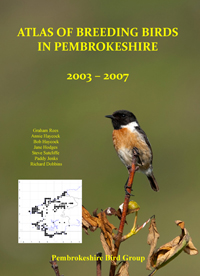Yellowhammer - 2003-07
 Friday, August 24, 2012 at 9:33PM
Friday, August 24, 2012 at 9:33PM Historically common and widespread in the county, it was still well-distributed during the 1984-88 survey, being detected in 82% of the tetrads. In the absence of comprehensive census data, three small sample areas were surveyed during 1989 and singing males recorded. On this basis extrapolation arrived at a county total of 14,000 – 15,000 territories. However, using data from the 1988-91 National Atlas, modified by the species' relative abundance in Pembrokeshire a figure of about 13,000 pairs can be derived for the county.
During this time the Yellowhammer was probably decreasing and the BBS subsequently recorded a 41% decline across Wales between 1994 and 2007. The Pembrokeshire survey of 2003-07 found there had been a 50% reduction in distribution since 1988. This suggests the population had reduced to about 7,000 pairs, if no allowance is made for any decrease in density. However, field-workers found Yellowhammers to be sparsely distributed in the tetrads where they were found and an assessment suggested an average density of four pairs per tetrad was realistic. This would generate a county estimate of about 800 pairs breeding. However, in at least 10 tetrads which were visited frequently throughout the 2003-07 survey, birds located in 2003 and 2004 could not be found during 2005–2007. It therefore seems likely that the breeding population in Pembrokeshire at the end of 2007 had decreased to below 800 pairs and may be disappearing at an increasing rate.
Changes in agricultural practices, resulting in a huge reduction in winter stubbles and a general reduction of weeds, are thought to be a major factor in the Yellowhammers decline. A reduction in farm dung heaps has also probably contributed. As a consequence of significant national declines, the Yellow-hammer was red-listed by the review “Birds of Conservation Concern 3” (Eaton et al., 2009).
Graham Rees

Fieldwork 2003-07 (based on 490 tetrads)
Red = breeding confirmed = 15
Orange = breeding probable = 142
Yellow = breeding possible = 31
Total tetrads in which registered = 188 (38.4%)
 Pembrokeshire Avifauna committee | Comments Off |
Pembrokeshire Avifauna committee | Comments Off |  GHR,
GHR,  PBBA 2003-7 in
PBBA 2003-7 in  Yellowhammer
Yellowhammer 
